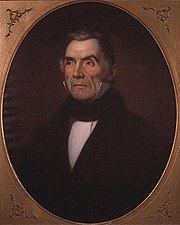Wolfred Nelson
|
Mayor Wolfred Nelson |
|
|---|---|

Wolfred Nelson, by Théophile Hamel, 1848
|
|
| 8th Mayor of Montreal | |
|
In office 1854–1856 |
|
| Preceded by | Charles Wilson |
| Succeeded by | Henry Starnes |
| Personal details | |
| Born | 10 July 1791 Montreal, Lower Canada |
| Died | 17 June 1863 (aged 71) Montreal, Province of Canada |
| Profession | doctor |
Wolfred Nelson (10 July 1791 – 17 June 1863) was from 1854 to 1856 the mayor of Montreal, Quebec.
Nelson was born in Montreal the son of William Nelson, an immigrant to Colonial America from Newsham, North Yorkshire, England. His mother, Jane Dies, was a teacher and daughter of an important land owner in the New York area.
Along with his younger brother Robert Nelson, he was known as a member of the Patriotes and his leading role in the Lower Canada Rebellion.
Nelson studied at the school of his father in William Henry (today Sorel, Quebec). He became a doctor in January 1811, and subsequently served in that capacity with the British troops on the War of 1812.
He moved to Saint-Denis-sur-Richelieu where he opened a distillery. He entered politics when elected in William Henry in 1827. He supported the Parti Patriote.
In 1827, he was elected as a member of the Legislative Assembly, but gave up active politics in 1830, without disavowing his reformist allegiance. He became a Patriote leader in the region of the Richelieu River valley, and supported the use of arms at the Assemblée des Six-Comtés in 1837.
In a prelude to the Lower Canada Rebellion of 1837, Nelson led 5,000 Patriotes in the two-day Assembly of the Six Counties in Saint-Charles, Lower Canada (present-day Quebec), on 23 and 24 October 1837, to protest the government's Russell Resolutions, taking place despite the 15 June Proclamation forbidding public assemblies. The conference delegates approved the Thirteen Resolutions, based on the republican document Rights of Man written by British and later American Revolutionary Thomas Paine, which was also adopted by proponents of both the American Revolution and the French Revolution. A Column of Liberty was also erected in Saint-Charles' Square.
...
Wikipedia
